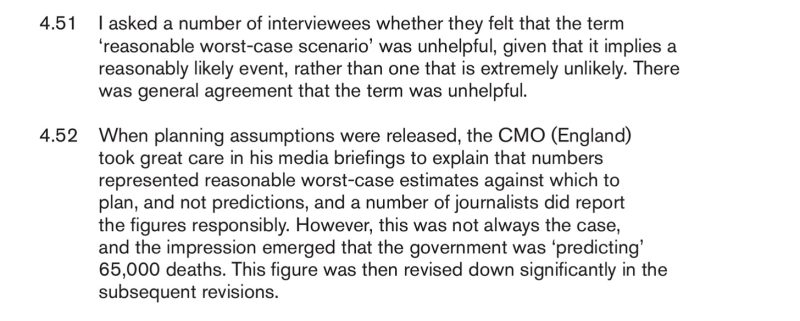We have held the belief that no politician who has not experienced the bestiality of war should ever be elected Prime Minister of any state. Ours is a belief and an aspiration, as those who have been in action are nowadays thin on the ground. Enforcing such a belief would entail restricting democracy: only veterans, front-line media and humanitarian agencies could be elected.
But this is the power of experience, as one of us has witnessed with his own eyes innocent Muslim villagers being forced at gunpoint to walk a minefield to ‘clear it’ by treading on death.
The mainstream media report Boris’s statements regarding the credibility of “reasonable worst-case scenarios” arising from models. Here is an excerpt of the Telegraph’s account:
The Government was slow to respond to Covid because worst-case scenario modelling for BSE (mad cow disease) and swine flu had turned out to be wrong in the past, Mr. Johnson said.
In the 2009 swine flu pandemic, it was predicted that up to 65,000 people might die. However, just 457 people succumbed to the virus. Likewise, only 178 people died from mad cow disease caused by infected beef, despite claims it could kill 136,000.
Asked by the inquiry counsel whether the scares had contributed to the Government’s hesitancy, Mr. Johnson said: “I do remember the BSE scare and I remember the immense destruction that it did to the agricultural sector in this country and the way that all turned out.”
For Boris, the power of experience was at work, too; he is a classics graduate, journalist, writer, and former politician; however, as an avid historian, he has a grasp of prior modelling mistakes.
In 2001, Neil Ferguson and colleagues used modelling to make predictions about control strategies for the foot-and-mouth epidemic in Great Britain:
Hastening the slaughter of animals with suspected infection is predicted to slow the epidemic, but more drastic action, such as ‘ring’ culling or vaccination around infection foci, is necessary for more rapid control. Culling is predicted to be more effective than vaccination.
And what about Ferguson’s 2005 prediction for containing an emerging influenza pandemic in Southeast Asia, which influenced the stockpiling of modestly performing antivirals and helped focus on the only game in town (influenza), ignoring all other pathogens?
We predict that a stockpile of three million courses of antiviral drugs should be sufficient for elimination. Policy effectiveness depends critically on how quickly clinical cases are diagnosed and the speed with which antiviral drugs can be distributed.
These widely exaggerated claims contributed to the 2009 influenza and COVID-19 debacle: The ‘ring containment’ and ‘We must act now’ messages create the illusion of controlling both.
As for swine flu, Ferguson popped up again. Chief Medical Officer Liam Donaldson revealed the NHS was planning for a ‘worst case scenario’ of 65,000 deaths if the IFR was as high as 0.35% and 19,000 deaths if it was a rate of 0.1%.
Based on Ferguson’s modelled worst-case estimates, the figures were considered unhelpful in Dame Deirdre Hind’s independent review of the UK’s response to the 2009 influenza pandemic.

With such noble advisers who mocked him in writing, alongside the sublime fortune-telling skills of modellers, is it that surprising that Mr. Johnson did not know what to do?
He should have sat on his hands until he was sure he was following the evidence, but pressure from media coverage of apocalyptical models, which he had good reason to distrust, was too much.
If we are to jump at every mystery bug, then with the latest fears of China’s ‘mystery’ pneumonia sweeping the world, we’ll be locking down near every year.
In the 2020 death debacle, there are still a lot of unexplained features, which we will be exploring in future posts – if we are not culled before we get to it.
Republished from The Daily Sceptic
Join the conversation:

Published under a Creative Commons Attribution 4.0 International License
For reprints, please set the canonical link back to the original Brownstone Institute Article and Author.










